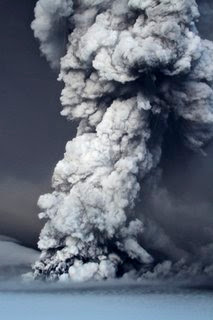 |
| Icelandic Volcano Flings Up Ash, Shuts Airport |
Iceland - Iceland closed its primary international airport and canceled all domestic flights Sunday as a powerful volcanic eruption sent a plume of ash, smoke and steam 12 miles (20 kilometers) into the air.
The eruption of the Grimsvotn volcano was far larger than a single a year ago at a different Icelandic volcano that upended travel plans for ten million men and women around the globe, but scientists stated it was unlikely to have the same widespread impact.
University of Iceland geophysicist Magnus Tumi Gudmundsson said this eruption, which started Saturday, was Grimsvotn's biggest eruption for 100 years.
"(It was) a great deal bigger and a lot more intensive than Eyjafjallajokull," the volcano whose April 2010 eruption shut down airspace across Europe for five days, he mentioned.
"There is really a pretty massive area in southeast Iceland where there is practically total darkness and heavy fall of ash," he stated. "But it isn't spreading practically as a lot. The winds will not be as strong as they had been in Eyjafjallajokull."
He said this ash is coarser than last year's eruption, falling for the ground a lot more swiftly rather than floating vast distances.
The ash plunged places near the volcano in southeast Iceland into darkness Sunday and covered buildings, automobiles and fields inside a thick layer of gray soot. Civil protection workers urged residents to wear masks and remain indoors.
Iceland's air targeted visitors control operator ISAVIA mentioned the Keflavik airport, the country's most important hub, closed down at 0830 GMT (4:30 a.m. EDT) for the day.
Spokeswoman Hjordis Gudmundsdottir said the ash plume was covering Iceland, but "the great news is that it's not heading to Europe," blowing northwest toward Greenland instead.
President Barack Obama was flying Sunday night to Ireland, but there was no immediate word on no matter if the volcano would have an effect on Air Force One's flight path.
Trans-Atlantic flights had been getting diverted away from Iceland, but there was no indication the eruption would lead to the widespread travel disruption triggered last year by ash from Eyjafjallajokull.
In April 2010, officials closed the continent's air space for five days, fearing the ash could harm jet engines. Millions of travelers were stranded.
The Grimsvotn volcano, which lies beneath the uninhabited Vatnajokull glacier about 120 miles (200 kilometers) east with the capital, Reykjavik, started erupting Saturday for the first time since 2004.
Gudmundsson stated the new eruption was ten occasions as effective as the 1 in 2004, which lasted for several days and briefly disrupted international flights. Grimsvotn also exploded in 1998, 1996 and 1993, eruptions that lasted amongst per day and numerous weeks.
Sparsely populated Iceland is one of the world's most volcanically active nations and eruptions are frequent. Grimsvotn and Iceland's other important volcanoes lie on the Atlantic Rift, the meeting of the Euro and American continental plates.
Eruptions normally lead to regional flooding from melting glacier ice, but hardly ever result in deaths.
Gudmundsson said it was tricky to predict how lengthy the eruption would final, however it may possibly currently be slowing.
"There are some indicators the eruption plume is finding lower now," he mentioned. "We may perhaps be seeing the first sign that it can be beginning to decline. In two or 3 days the worst will need to be over.





No comments:
Post a Comment